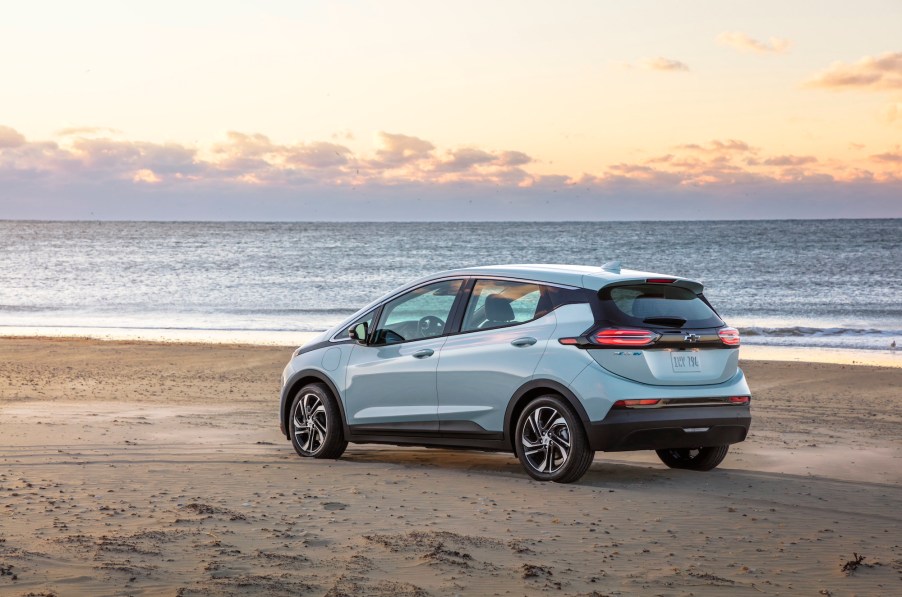
Does the Chevy Bolt Qualify for the EV Tax Credit in 2021?
As the auto industry rolls out more electric vehicles, consumers are warming up to the idea of EVs. One model that’s been around since 2017 is the Chevy Bolt EV. This electrified hatchback might not be the most exciting pick, but it’s a practical, affordable starter car for those new to EVs. So if you’re considering a Chevy Bolt, here are some things you should know about it, including whether it qualifies for the EV tax credit.
The federal EV tax credit
The high sticker price on EVs has made some consumers skittish from the beginning. Tesla CEO Elon Musk told the Boston NPR station WBUR in a 2009 interview that within five years, Tesla would produce an EV for under $30,000. It’s now 12 years later, and he hasn’t made good on that promise.
So, what drives the purchase price of EVs up and keeps them out of many consumers’ budgets? There are a couple of reasons. The first is the cost of lithium-ion batteries. The other is the well-intentioned $7,500 federal EV tax credit.
According to the U.S. Department of Energy, it grants up to $7,500 in nonrefundable tax credits to the first 200,000 buyers of eligible EVs per automaker. By nonrefundable, it means buyers get a discount on their federal taxes that year. If you owe $7,500 that year in taxes, great — you’re covered. If you only owe $2,000 in federal taxes, you can claim only $2,000 of the credit. You don’t get to pocket the excess.
Once the automaker sells 200,000 eligible EVs, the tax credit gets cut in half to $3,750 maximum for the next six months following that quarter. The next six months, it’s halved again, to $1,875. Then it’s phased out.
Is the Chevy Bolt EV eligible for the tax credit?
Because General Motors, like Tesla, has already reached the 200,000 buyer milestone for eligible EVs, any new Chevy Bolt purchased after 3/31/2021 doesn’t qualify for the federal EV tax credit.
However, if you bought a 2017 to 2020 Chevy Bolt EV between 1/1/10 and 3/31/19, you might be eligible for up to a $7,500 tax credit. If you purchased a Bolt from those model years between 4/1/19 to 9/30/19, you might qualify for up to $3,750. Finally, if you bought a Bolt from those model years between 10/1/19 to 3/31/20, you might be eligible for $1,875.
Is the Bolt affordable without the incentive?
The best thing about the 2021 Chevy Bolt EV might be its simple approach. It might not be as attention-getting as a Tesla EV, but this little hatchback has a lot going for it. The ride is smooth, the interior is spacious, and it’s loaded with great standard features.
The Bolt also has an impressive EPA-rated range of 259 miles. It charges quickly, too, so you can juice it up to 100 miles of range in just 30 minutes. Plus, in 2021, Chevrolet made the previously optional DC fast charger standard on Premier trims.
Overall, it has a nerdy attitude on the outside and a comfortable cabin, though not upscale. Considering that the starting price is just under $40,000, its basic vibe might make some shoppers pause. Still, the electric motor sends 266 lb-ft of torque to the front wheels for exciting acceleration.
However, if you seek a bit of luxury, the Premier trim comes with exclusive content, Car and Driver reports. Expect leather seats, heated rear seats, ambient cabin lighting, and more. But C/D’s reviewers don’t think it’s worth the extra spend. And considering the lack of an EV tax credit, they might be right.
Still, the LT trim is affordable, even without federal credit, and offers many popular features to make it enticing. With the Driver Confidence package, the 2021 Chevy Bolt boasts blind-spot monitoring, rear-cross traffic alert, and rear parking sensors for greater convenience and safety.


